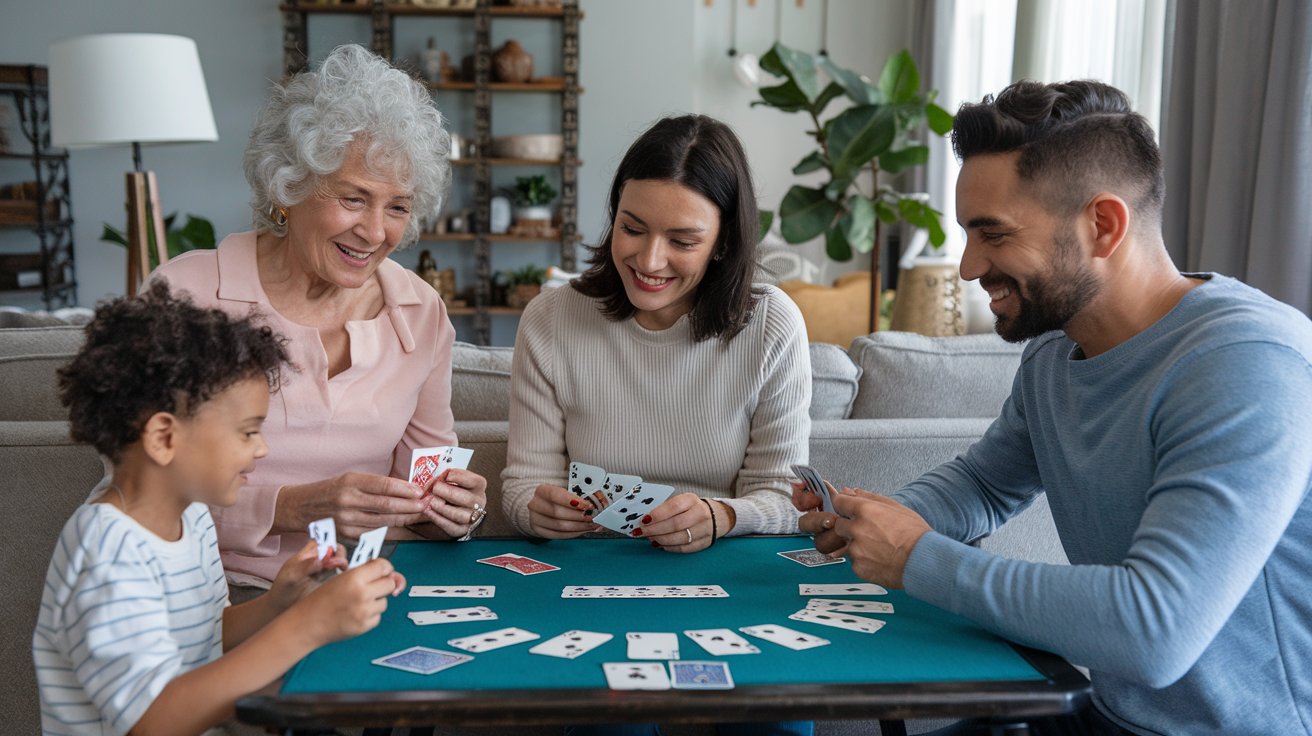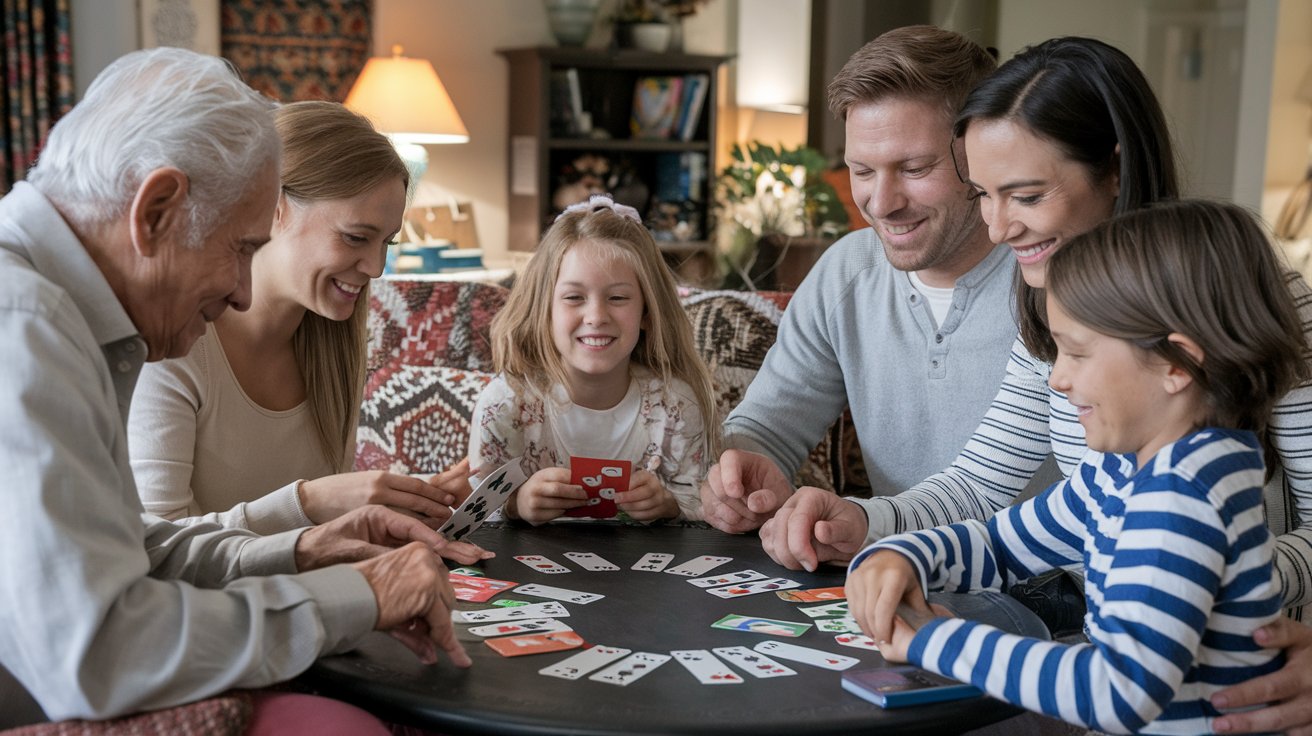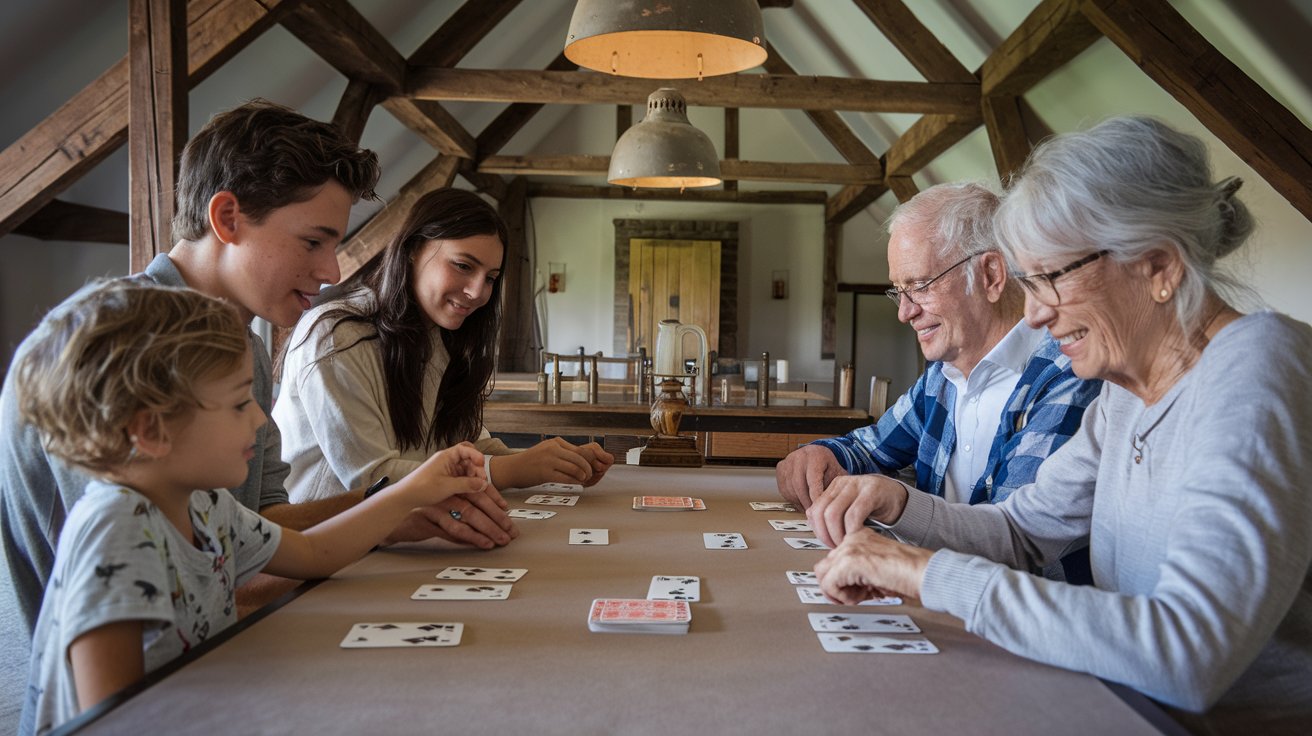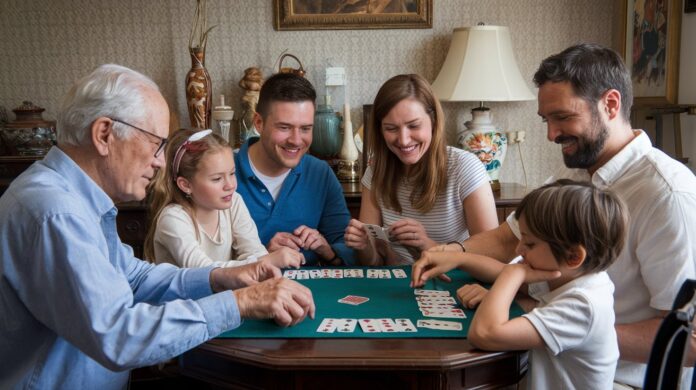In an age where family members often sit in the same room yet exist in separate digital worlds, the simple act of gathering around a table to play cards has become something of a radical tradition. Among the card games that have stood the test of time in Indian households and beyond, rummy holds a special place—not just as entertainment, but as a powerful vehicle for intergenerational bonding.
There’s something almost magical about watching a grandmother teach her granddaughter the same game she learned from her own grandparents decades earlier. The shuffling of cards creates a rhythm that has remained consistent across generations, while strategies and techniques pass from older family members to younger ones in a living chain of tradition.
This exploration delves into how rummy—with its perfect balance of skill, strategy, and chance—creates unique opportunities for meaningful connection across age groups. From teaching patience and strategic thinking to creating spaces for natural conversation and shared experience, rummy has quietly but effectively strengthened family bonds for generations. As we shuffle through the various dimensions of this phenomenon, we’ll discover how a simple deck of cards continues to bridge generational divides in an increasingly fragmented world.
Historical Context: A Game That Transcends Time
Origins and Evolution
Rummy’s origins stretch back centuries, with roots potentially tracing to early Spanish card games or Chinese tile games. What makes rummy remarkable is how it has evolved across cultures while maintaining its core essence. This adaptability has allowed it to remain relevant across multiple generations, unlike many games that fade with changing times.
By the early 20th century, rummy had established itself in households worldwide, including widespread popularity in India, where it developed distinct regional variations. This long history means that many families can trace their rummy traditions back several generations, creating a tangible link to their ancestors.
From Necessity to Tradition
In earlier decades, before the proliferation of electronic entertainment, card games like rummy weren’t merely optional pastimes—they were essential family entertainment. During long power outages, monsoon seasons when outdoor activities were limited, or in households where other entertainment was financially out of reach, rummy provided reliable engagement for all ages.
What began as a practical solution for family entertainment gradually transformed into a cherished tradition. Even as televisions, computers, and smartphones entered homes, many families maintained their rummy rituals, recognizing the unique value of face-to-face interaction that the game facilitated.
The Intergenerational Bridge: Connecting Family Members Across Age Gaps

When Age Hierarchies Dissolve
One of the most remarkable aspects of rummy is how it temporarily suspends typical family hierarchies. At the rummy table, age often becomes irrelevant as skill and strategy take precedence. A teenager can legitimately triumph over a grandparent; a child can learn to compete fairly with adults.
This temporary dissolution of age-based authority creates rare moments of equalitarian interaction between generations that might otherwise interact primarily through hierarchical relationships. The grandmother who normally gives instructions becomes a fellow player; the child who normally follows rules becomes a worthy opponent.
Learning and Teaching: The Two-Way Exchange
The teaching of rummy creates beautiful moments of knowledge transfer between generations:
- Explicit instruction: Older family members teach rules, strategies, and techniques to younger players
- Observational learning: Children absorb mathematical thinking, patience, and social cues by watching experienced players
- Reverse mentoring: As younger players develop their own strategies, they sometimes introduce innovative approaches that older players adopt
Unlike many traditional knowledge transfers that flow strictly from older to younger generations, rummy creates opportunities for bidirectional learning. A grandmother might teach her granddaughter the rules she’s known for decades, but later adopt a strategic innovation the younger player developed.
The Psychology of Shared Activity: Why Card Games Create Strong Bonds

The Power of Regular Ritual
Family rummy sessions that occur with regularity—whether weekly game nights, holiday traditions, or summer vacation rituals—create psychological anchors that family members come to anticipate and value. These recurring rituals:
- Provide stability and predictability in family relationships
- Create shared reference points for family members (“Remember that time Dad finally won after losing ten games straight?”)
- Establish family-specific traditions that strengthen collective identity
Research in family psychology has consistently shown that regular family rituals significantly contribute to children’s sense of belonging and security. A simple weekly rummy night can become a cornerstone of family identity.
The “Flow State” Effect
When families engage in rummy, they often enter what psychologists call a “flow state”—a condition of complete absorption in an activity that is challenging yet attainable. This shared flow experience:
- Creates a collective focus that temporarily suspends external concerns
- Reduces awareness of generational differences and conflicts
- Produces shared positive emotions through mutual engagement
The neurochemistry of these shared flow states includes releases of oxytocin and endorphins—the same bonding chemicals produced during other close human interactions—potentially strengthening family attachments at a biological level.
Life Lessons at the Card Table: Rummy as Educational Tool
Mathematical Thinking and Strategic Planning
Beyond the joy of playing, rummy quietly imparts crucial cognitive skills across generations:
- Pattern recognition: Identifying potential sequences and sets
- Probability assessment: Calculating the likelihood of drawing needed cards
- Memory development: Tracking discards and other players’ potential strategies
- Decision-making under uncertainty: Making optimal moves with incomplete information
When grandparents teach grandchildren rummy, they’re simultaneously developing mathematical thinking in a natural, enjoyable context. Unlike formal educational settings, the card table offers immediate application of abstract concepts with tangible feedback.
Social and Emotional Learning
Perhaps even more valuable than the cognitive benefits are the social and emotional lessons transmitted through the game:
- Patience and frustration tolerance: Waiting for turns and desired cards
- Graceful winning and losing: Maintaining appropriate reactions to outcomes
- Reading nonverbal cues: Noticing subtle reactions in other players
- Ethical behavior: Following rules even when tempted to cheat
Many parents and grandparents intentionally use rummy as a vehicle for teaching these crucial life skills, offering gentle guidance on sportsmanship and emotional regulation during play.
Communication Pathways: Creating Space for Meaningful Exchange

The Security of Structured Interaction
One of rummy’s most underappreciated contributions to family bonding is how it creates a structured context for interaction that feels safe and predictable. This is particularly valuable for:
- Teenagers who might otherwise avoid extended family interactions
- Family members during periods of tension or transition
- Introverted family members who find unstructured social time challenging
- Reconnecting after periods of separation or distance
The game provides a shared focus that reduces the pressure of direct conversation while still enabling meaningful contact. Many families report that their most authentic conversations happen during or immediately after card games, when the activity has created a foundation of comfortable togetherness.
Stories, Jokes, and Family Lore
The rummy table often becomes a natural setting for the transmission of family stories, histories, and values. Between hands or during casual play, older generations share:
- Family origin stories and heritage
- Personal experiences from their own childhoods
- Values and philosophical perspectives
- Family jokes and humor traditions
This organic storytelling happens without the self-consciousness that might accompany more deliberate attempts to pass down family history. The relaxed atmosphere of the game creates ideal conditions for authentic sharing across generations.
Digital Age Challenges and Adaptations
Competing with Digital Entertainment
In contemporary households, traditional card games face unprecedented competition from digital entertainment options designed with psychological precision to capture attention. Many families have found creative ways to preserve their rummy traditions:
- Establishing “tech-free” evenings dedicated to card games and other analog activities
- Creating special occasion traditions where rummy is an expected activity
- Developing family-specific rules or variations that make their version unique and special
- Integrating rewards or special treats that make game nights more enticing
Families who successfully maintain these traditions often report that while initial resistance (particularly from younger members) may occur, the satisfaction of genuine connection typically wins over even the most reluctant participants.
Virtual Adaptations: Maintaining Tradition Across Distance
For families separated by geographic distance, technology has paradoxically helped preserve rummy traditions through:
- Video calls where multiple households play together with separate decks
- Online rummy platforms that allow distant family members to play together
- Mixed sessions where some members gather physically while others join digitally
These adaptations reveal how the essence of the tradition—the connection it facilitates—can transcend its physical form when necessary, allowing geographically dispersed families to maintain their bonding rituals.
Cultural Variations: Rummy Traditions Across Communities
Indian Family Traditions
In Indian households, rummy holds particular significance as a family bonding activity, with distinctive characteristics:
- Strong associations with specific festivals, particularly Diwali
- Integration with cultural values around family hierarchy and togetherness
- Regional variations that reflect local customs and preferences
- Multi-generational households where three or more generations regularly play together
The Indian tradition of “teen patti” and other card games during Diwali creates an annual anchor point when family rummy sessions take on special significance, often involving extended family members across multiple generations.
Global Adaptations
Around the world, rummy has been adapted into numerous cultural contexts, each with unique intergenerational aspects:
- Mediterranean families: Emphasis on animated expression and lively banter during play
- Latin American households: Integration with music and celebration
- North American game nights: Structured weekly or monthly gatherings
- European traditions: Café culture where older and younger generations play in public spaces
These cultural variations demonstrate rummy’s remarkable adaptability while highlighting the universal value of intergenerational play it facilitates across diverse settings.
Therapeutic Benefits: When Cards Heal Family Rifts
Creating Common Ground
Family therapists have sometimes recommended card games like rummy as interventions for healing strained relationships because they:
- Provide neutral territory for positive interaction
- Focus attention on shared activity rather than conflicts
- Create opportunities for cooperation and mutual enjoyment
- Establish rhythmic turn-taking that can restore balanced communication
While not a replacement for professional help in serious family conflicts, regular rummy sessions have helped countless families navigate difficult transitions and tensions by maintaining a channel of positive connection.
Supporting Cognitive Health Across Generations
For older family members, regular rummy play offers cognitive benefits that can be significant:
- Mental stimulation that may help maintain cognitive function
- Social connection that counters isolation
- Purpose and engagement through teaching younger generations
- Continuity of identity through maintaining lifelong skills
These benefits create a virtuous cycle where the elder generation receives health benefits while younger generations receive wisdom and connection, strengthening family bonds in multiple directions.
Creating Your Own Family Rummy Tradition
Getting Started: Practical Approaches
For families interested in establishing or strengthening their own rummy traditions, successful approaches include:
- Starting with simplified versions for younger players
- Establishing regular, predictable times for play
- Creating family-specific rules or scoring systems
- Developing special traditions around the game (special snacks, music, or settings)
- Connecting play to existing family gatherings and celebrations
The most sustainable traditions typically start small and grow naturally as family members discover the genuine pleasure of connection the game provides.
Preserving and Evolving Family Traditions
Successful multi-generational rummy traditions balance preservation and evolution by:
- Documenting family-specific rules and variations
- Capturing stories and memories associated with the game
- Allowing for innovations that keep the tradition fresh
- Creating physical keepsakes (special card decks, score sheets, etc.)
- Photographing or recording special game sessions
This balance of honoring tradition while embracing change helps ensure that family rummy traditions remain vibrant and meaningful rather than becoming stale obligations.
Conclusion: The Simple Magic of Shared Play
In an era of increasingly sophisticated entertainment options and fragmented family attention, the humble rummy deck offers something surprisingly profound—a bridge across generations that creates genuine connection through shared experience. The game’s perfect blend of skill and chance, strategic depth and accessibility, structure and spontaneity makes it uniquely suited to bringing family members of different ages together in meaningful interaction.
Beyond the immediate pleasure of play, family rummy sessions create lasting memories, transmit important values and skills, and strengthen the intergenerational bonds that provide both young and old with a sense of belonging and continuity. As one grandmother put it: “When I teach my grandchildren the game my grandfather taught me, I feel like I’m passing along not just rules, but a piece of our family soul.”
As families navigate the challenges of maintaining connection in a rapidly changing world, perhaps the answer sometimes lies not in the newest technology or most elaborate plans, but in the simple act of gathering around a table, shuffling a deck of cards, and dealing seven cards to each beloved family member. In those moments, the distances of age, experience, and perspective temporarily dissolve, replaced by the timeless joy of playing together.
The next time cards are shuffled in your family gathering, look around the table and observe the magic that happens when generations connect through play. In the simple act of taking turns, arranging cards, and sharing triumph and disappointment, family bonds are quietly strengthened—one hand at a time.

Zareb Saleh is a journalist at Gulf Today and a ghostwriter for Gameoholic, specializing in gaming, technology, and digital culture. With a keen eye for industry trends, he delivers insightful stories that engage and inform readers.




